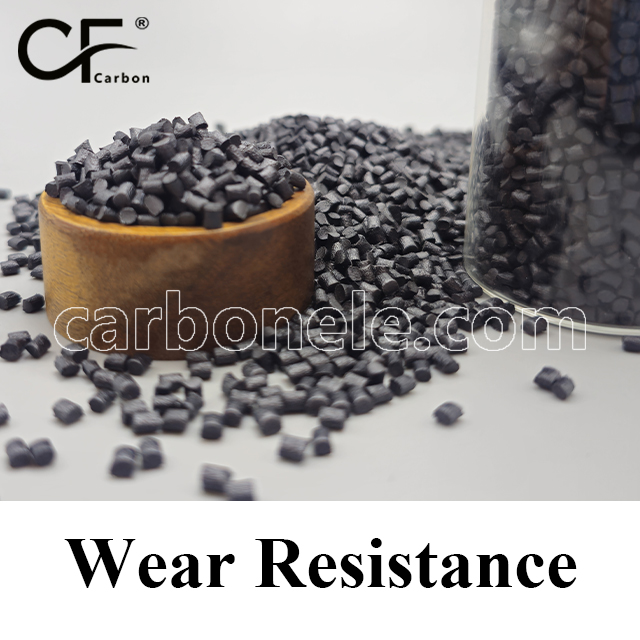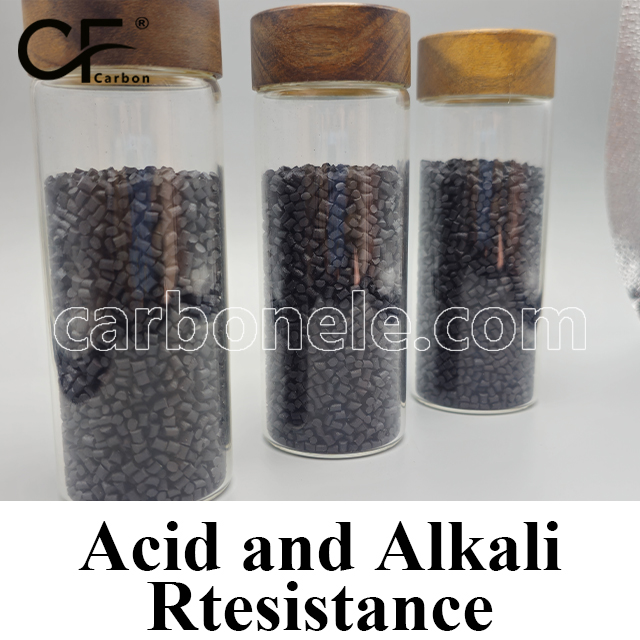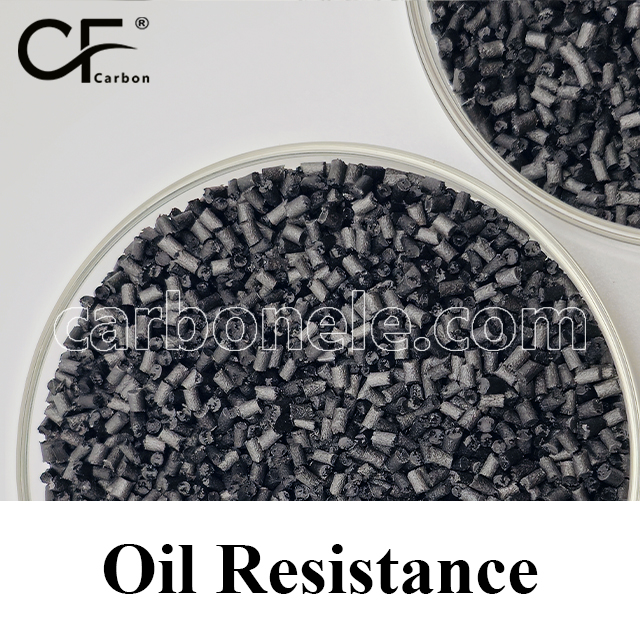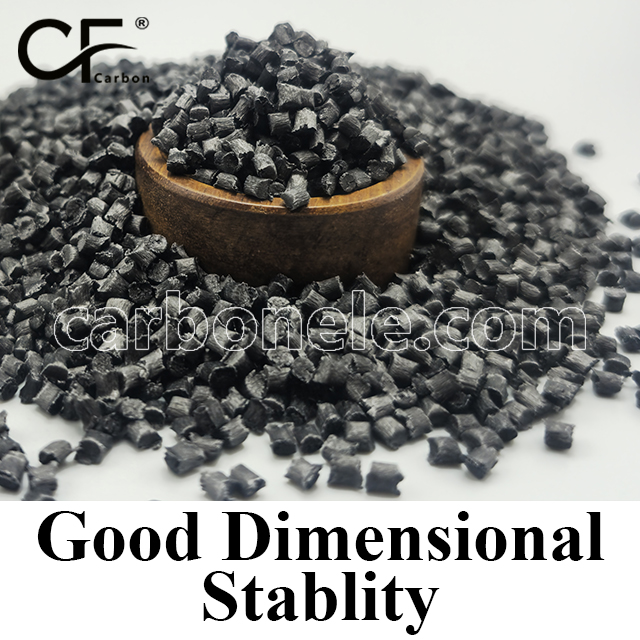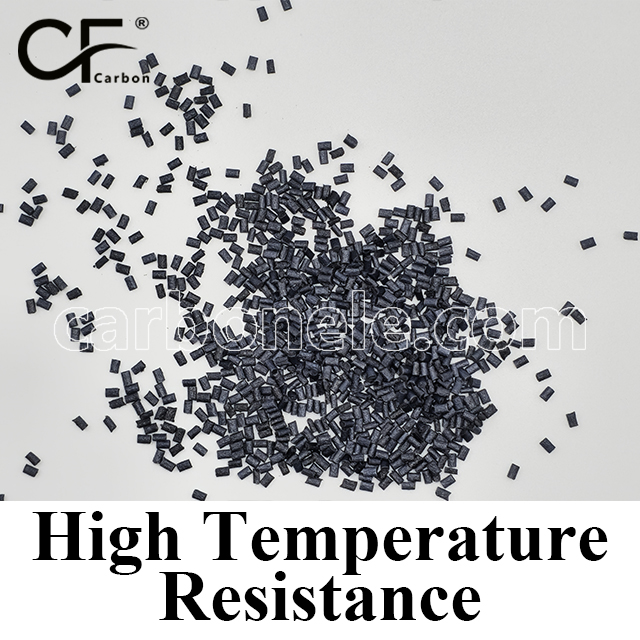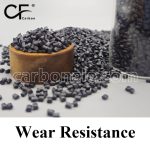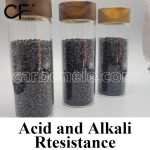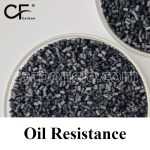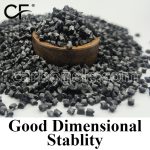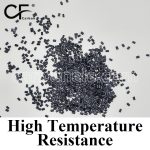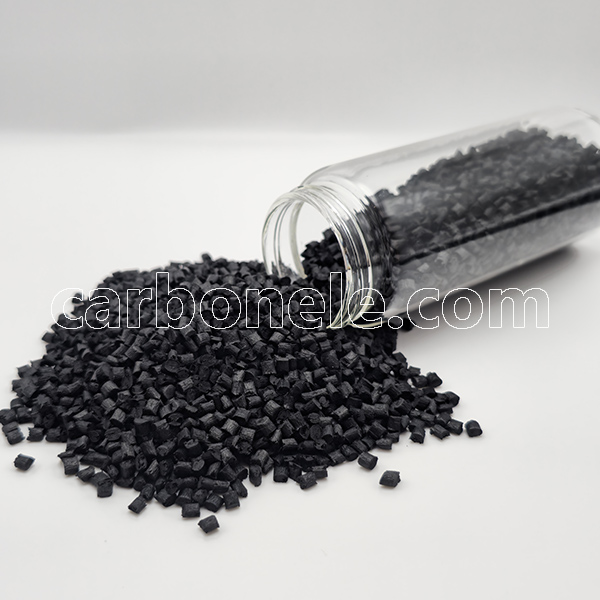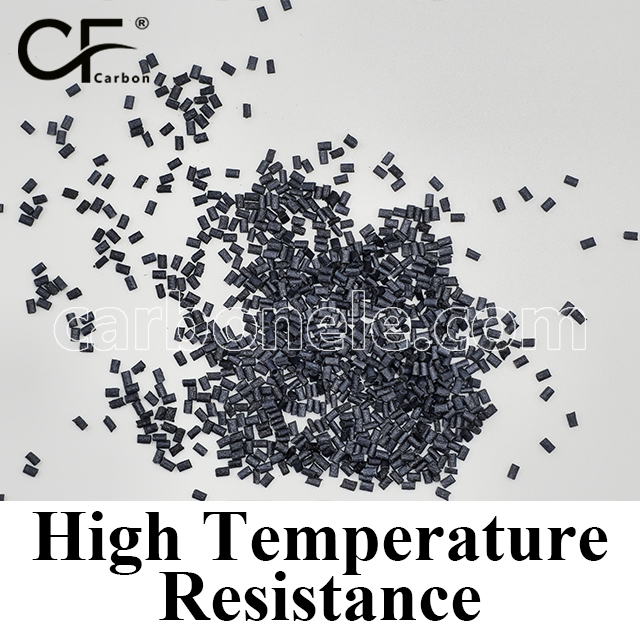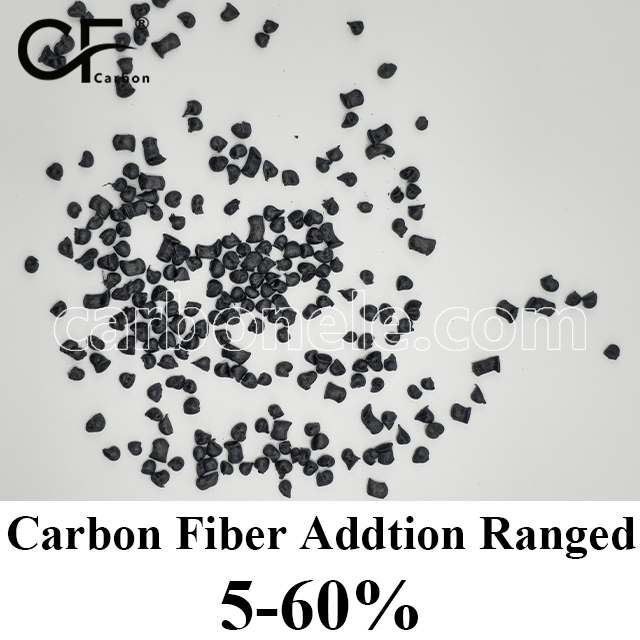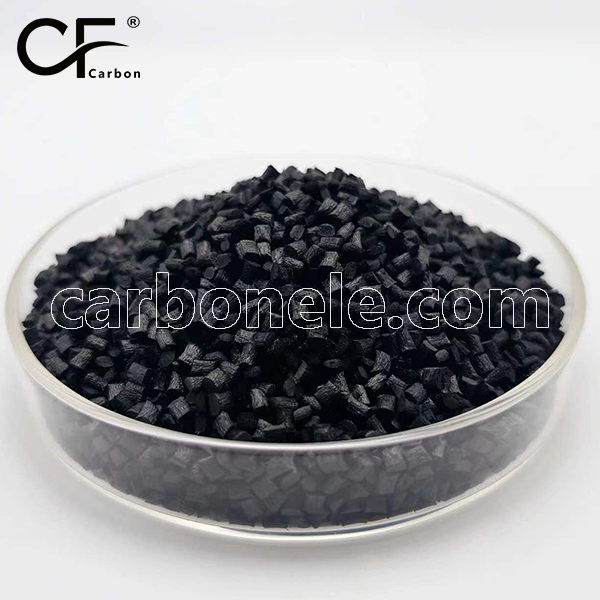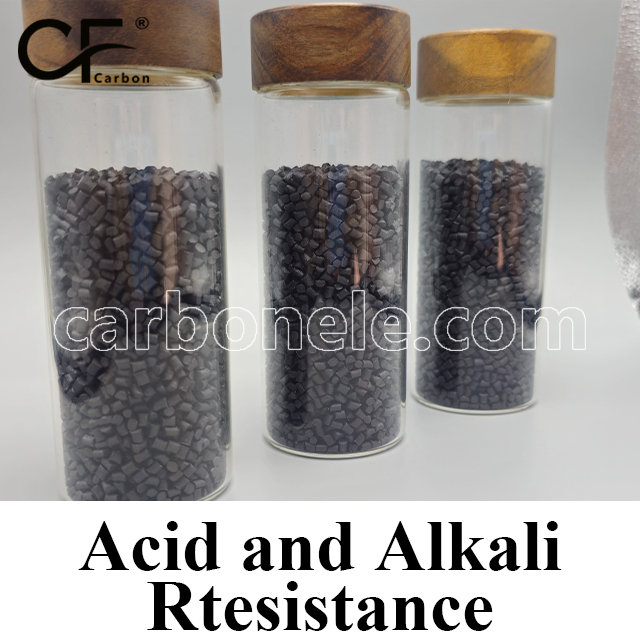
Superior Strength Material PA12-CF60
- Model number: PA12-CF-BCA6
- Matrix Resin: Polyamide12 (Nylon12) (PA12)
- Reinforcing Filler: Carbon fiber
- Appearance: Granules
- Grade: Injection/extrusion grade
- Packaging: 25kgs/bag
Introduction to PA12-CF60 Material
PA12-CF60 (Polyamide 12 Carbon Fiber Composite) is a high-performance thermoplastic composite material reinforced with 60% carbon fiber in a polyamide 12 matrix. This advanced material offers superior mechanical properties, enhanced thermal stability, extremely low moisture absorption, and excellent chemical resistance. PA12-CF60 is ideal for demanding applications in automotive, aerospace, and industrial sectors, where extreme strength, stiffness, and durability are required under high-load and high-heat conditions. The substantial carbon fiber content greatly improves the material’s performance, making it suitable for the most demanding environments.
Characteristics and Values for Enhanced Performance
Carbon Fiber Content: 60%
The 60% carbon fiber reinforcement delivers exceptional structural strength and stiffness while maintaining a lightweight nature. This makes PA12-CF60 ideal for applications where strength and weight reduction are both critical.
Tensile Strength: ≥ 200 MPa
PA12-CF60 exhibits superior tensile strength, allowing it to handle high mechanical loads without deformation, making it perfect for parts subjected to heavy stress.
Flexural Strength: ≥ 350 MPa
The high flexural strength ensures PA12-CF60 retains its shape and performance even under significant bending stresses, ideal for components exposed to dynamic forces.
Impact Strength: ≥ 35 kJ/m²
With excellent impact resistance, PA12-CF60 can endure extreme shocks and impacts, providing long-lasting durability even in harsh environments.
Thermal Properties
Heat Deflection Temperature: Approximately 240°C
PA12-CF60 maintains its mechanical integrity at higher temperatures, making it suitable for high-heat environments such as engine compartments, industrial machinery, and aerospace applications.
Long-Term Service Temperature: Up to 130°C
This material demonstrates reliable performance across a wide temperature range, ensuring consistent stability and functionality for long-term use.
Chemical Stability
PA12-CF60 offers excellent resistance to a wide range of chemicals, including oils, fuels, lubricants, and solvents, making it highly suitable for demanding applications in automotive, aerospace, and industrial settings. Its low moisture absorption ensures dimensional stability even in humid environments, making it reliable for extended service life.
Processing Characteristics
PA12-CF60 can be processed efficiently using injection molding, extrusion, and 3D printing methods. Its excellent flow properties ensure consistent part quality, even in complex geometries, making it perfect for high-precision and high-volume production.
Other Characteristics
Low Water Absorption:
Minimal moisture uptake ensures dimensional stability and reliable performance, even in humid or wet conditions.
Excellent Wear Resistance:
PA12-CF60 is designed to perform in high-wear applications, providing superior durability and longevity over time.
Applications
Automotive Industry:
Used in structural components, brackets, housings, and other high-strength, high-stiffness parts that require thermal stability and durability.
Aerospace:
Ideal for lightweight, high-performance components such as brackets, housings, and functional parts exposed to extreme temperatures and stresses.
Industrial Manufacturing:
Perfect for gears, bearings, bushings, and other components requiring superior wear resistance and durability under heavy load conditions.
Consumer Goods:
Applied in tools, sporting equipment, and other products where high strength, low weight, and durability are essential.
Summary Table
| Characteristic | Value/Description |
|---|---|
| Carbon Fiber Content | 60% |
| Tensile Strength | ≥ 200 MPa |
| Flexural Strength | ≥ 350 MPa |
| Impact Strength | ≥ 35 kJ/m² |
| Heat Deflection Temperature | Approximately 240°C |
| Long-Term Service Temperature | Up to 130°C |
| Chemical Resistance | Excellent resistance to oils, fuels, and solvents |
| Water Absorption | Low |
| Processing Methods | Injection molding, extrusion, 3D printing |
Thermal Stability of PA12-CF
PA12-CF composites exhibit significantly enhanced thermal stability compared to standard PA12 due to the incorporation of carbon fiber. As the carbon fiber content increases, the material's ability to withstand elevated temperatures improves, allowing it to maintain mechanical properties in high-temperature environments. This enhanced heat deflection temperature makes PA12-CF suitable for applications that require reliable performance under thermal stress. The superior thermal stability ensures that components made from PA12-CF can operate effectively in demanding conditions, thereby expanding their usability across various industries, including automotive and aerospace. The combination of lightweight characteristics and improved heat resistance positions PA12-CF as an excellent choice for applications that prioritize both strength and thermal performance.
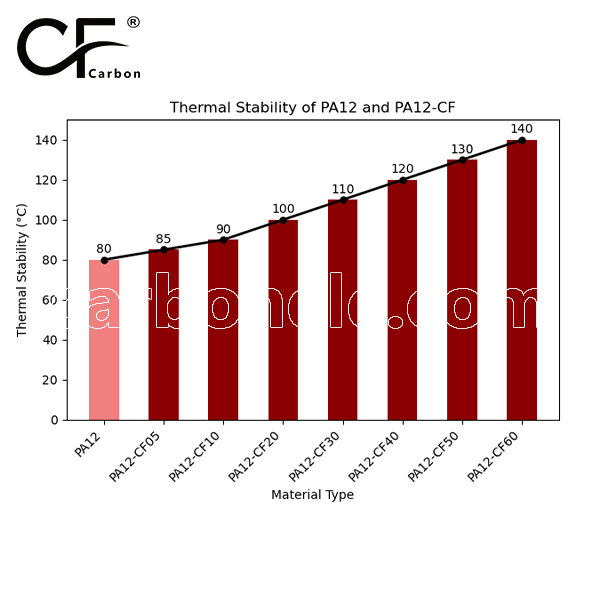
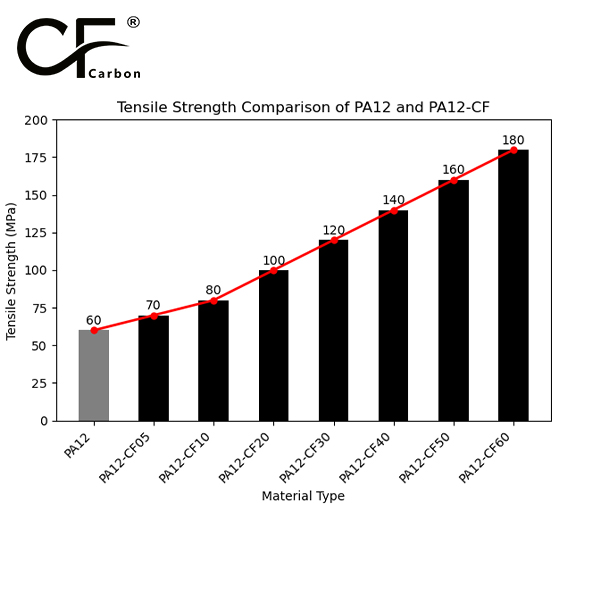

Frequently Asked Questions
Carbon (Xiamen) New Material Co., Ltd. aims to provide buyers with "one-stop" worry-free high-quality services. Here you can find all information about carbon fiber engineering plastics. If you still have questions, please send us an email for consultation!
-
How can I contact the manufacturer of a product that interests me?
When you find a product you are interested in, you can contact the manufacturer directly by sending an email and we will get back to you as soon as possible.
-
How do I find the products that interest me?
All you need to do is enter the keyword, product name in the search window and press the Enter key on your keyboard. Your search results page will then be displayed. You can also search within the product category pages on the home page. Each category is divided into subcategories, allowing you to refine your search and find products that interest you.
-
Where will I find a buying guide?
Please contact our after-sales service directly and we will provide you with a comprehensive operating guide.
-
What are CF Reinforced Thermoplastic Composites?
CF Reinforced Thermoplastic Composites are materials where carbon fibers are incorporated into a thermoplastic matrix. They combine the strength and stiffness of carbon fibers with the processability and recyclability of thermoplastics. For instance, they are used in automotive parts like bumper beams.
-
What are the benefits of CF Reinforced Thermoplastic Composites over traditional composites?
The key benefits include faster production cycles, easier recyclability, and better impact resistance. They also offer design flexibility. An example is in the manufacturing of consumer electronics casings where complex shapes can be achieved more easily.
-
How are CF Reinforced Thermoplastic Composites processed?
Common processing methods include injection molding, extrusion, and compression molding. Injection molding is widely used for mass production. For example, in the production of small components for the medical industry.
-
What industries use CF Reinforced Thermoplastic Composites?
They are utilized in aerospace, automotive, medical, and sports equipment industries. In aerospace, they can be found in interior components. In the medical field, they might be used in prosthetics.
-
How does the carbon fiber content affect the properties of the composites?
Higher carbon fiber content generally leads to increased strength and stiffness but may reduce ductility. A moderate content is often balanced for specific applications. For example, a higher content might be preferred in structural parts of a race car.
-
What are the challenges in using CF Reinforced Thermoplastic Composites?
Challenges include higher material costs, complex processing equipment requirements, and ensuring uniform fiber dispersion. Issues with adhesion between the fibers and the matrix can also arise. An example is in achieving consistent quality in large-scale production.








